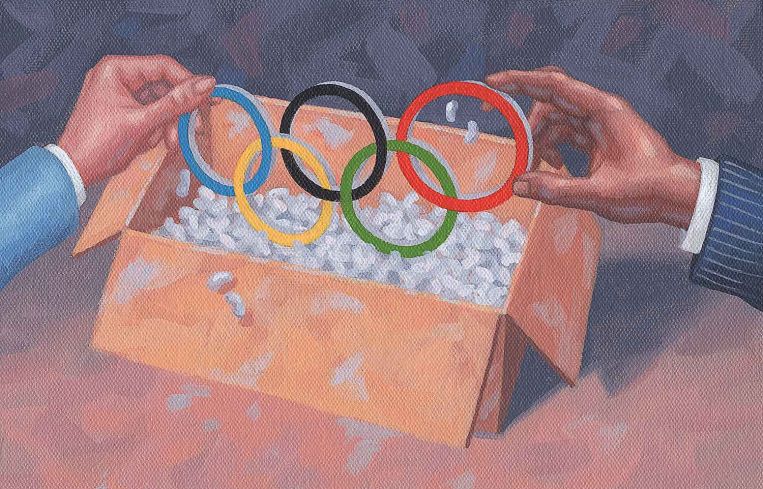Casey Wasserman Is Preparing L.A. for Its Biggest Event: the 2028 Olympics
By Greg Cornfield September 24, 2024 6:00 am
reprints
In terms of scale, no one on this year’s Power SoCal list comes close to the task that Casey Wasserman confronts. You might call it Olympian in scope.
In less than four years, more people than ever before, from more places than ever before, will descend upon Southern California for the 2028 Summer Olympics. It’s going to be big, and Wasserman is calling the shots.
“The Olympics in L.A. will be the largest peacetime gathering in the history of the world,” Wasserman said on a podcast interview earlier this year. “It is the operational equivalent of seven Super Bowls a day for 30 days.”
Wasserman is chairman of Wasserman Media Group, a sports and talent management agency. Then-Mayor Eric Garcetti recruited him to lead the city’s bid to host the Games, and he has since become the face of the committee organizing the massive event.
Los Angeles is an excellent fit to host considering its unparalleled number of large-scale sports venues, and Wasserman said L.A. is not building anything new for the Games. Iconic venues such as the Rose Bowl, the Coliseum, Dodger Stadium, the Forum, and even Riviera Country Club have been around for decades, if not a full century.
But the major selling point for Angelenos: No public funds will be used for the $7 billion gathering. Instead, there’s a chance the city could turn a profit. “We are the only country on Earth that provides no public support for its Olympic movement,” Wasserman said during the podcast. “If we can create a surplus, it stays to benefit the city forever. … We have more revenue contracted today than Paris will generate in total, and we’re four years from the Games.”
The 2028 Games could be like nothing else the country has ever seen. Los Angeles hosted the Olympics in 1984, but little can be learned from 40 years ago to inform the operation in 2028.
“The scale of the Olympics keeps growing,” Wasserman said. “The scale of our venues and the infrastructure here is stunningly different than in 1984.”
In addition to the much newer venues like the $5 billion SoFi Stadium, the $2 billion Intuit Dome, and even Crypto.com Arena, Wasserman pointed to the growth of UCLA’s campus, which will be the Olympic Village.
“In 1984, Olympic Village was split between USC and UCLA,” Wasserman explained. “But UCLA has built a tremendous amount of dorms. Now 90 percent of students live on campus.”
Of course, plenty of challenges lie ahead. Some obstacles have hamstrung the region for decades, like the lack of adequate public transportation expected in a first-class megalopolis — an especially glaring flaw after millions of spectators utilized the impressive subway system at the Paris Games.
Jaime Lee, CEO at L.A.-based development firm Jamison Realty (and a Power SoCal honoree), is on the organizing committee for the 2028 Olympics. She went to Paris this summer during the 2024 Games to learn best practices, and often took advantage of the Parisian underground.
“Paris has one of the greatest metro systems in the world,” she told Commercial Observer. “Their network is not only efficient, it’s far-reaching. It’s a very, very comprehensive system.”
Los Angeles’ rail system is expanding from Downtown to the Westside, through the Valley, and elsewhere. These are significant improvements, but it will still pale in comparison to the Paris region, and L.A.’s system will also likely depend on buses. The city will borrow some 5,000 buses to transport media, fans, athletes, officials and volunteers. And Wasserman said he’s lobbying officials to allow anyone with an Olympic ticket to use the Metro for free.
“Although we don’t have as robust an underground infrastructure for our Metro system, L.A. has one of the most highly utilized public transportation systems in our entire country, and people don’t know that,” Lee added.
Other issues have plagued the city for generations, and won’t be solved even by the generational event. Southern California can’t escape, but can hopefully adequately address, the discouraging effects of unrelenting homelessness and a lack of affordable housing. Wasserman is advocating for leaders and residents to work together to make as many improvements as feasible.
“Fifty million people come to L.A. every year,” he said. “If people don’t feel safe and comfortable coming to L.A. as tourists … and that goes down to 40 million, L.A. is probably bankrupt as a city.”
Wasserman said people are excited about what it means for the Olympics to come back to the U.S., especially in a city like L.A.
After the success of the Games in Paris, anticipation and expectations spiked, and the clock started ticking a bit louder — with fewer than 1,400 days until the torch runs into Stan Kroenke’s SoFi Stadium.
Gregory Cornfield can be reached at gcornfield@commercialobserver.com.



